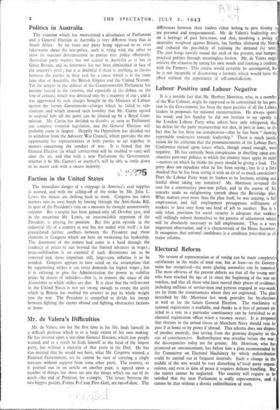Labour Positive and Labour Negative
It is a notable fact that Mr. Herbert Morrison, who, as a member. of the War Cabinet, might be supposed to be constrained by his posi- tion in the Government, has been the most positive of all the Labour leaders in proposals for national reconstruction. He always speaks his mind, and last Sunday he did not hesitate to say openly to the London Labour Party what others have only whispered, that his defeat for the party treasurership was due, in part at least, to the fact that he has been too conspicuous—that he has been " showing regrettable tendencies towards leadership." There is much justifi- cation for his criticism that the pronouncements of the Labour Party Conference turned upon issues which, though sound enough, were negative. He has certainly been conspicuous in dwelling upon con- structive post-war policies to which the country must apply its mind —matters on which he thinks his party should be giving a lead. The party does not repudiate what he has been saying ; but is it a little shocked that he has been saying it with an air of so much conviction? Does the Labour Party want its leaders to be hesitant, retiring and fearful about taking any initiative? Mr. Morrison re-stated the case for a constructive post-war policy, and in the course of his remarks made an enlightening remark about the Beveridge plan. What matters even more than the plan itself, he was arguing, is full employment, and full employment presupposes willingness of workers to turn over from one kind of job to another. But it is only when provision for social security is adequate that workers will willingly submit themselves to the process of adjustment which will be absolutely necessary to full employment. That is a very important observation, and it is characteristic of the Home Secretary. It recognises that national confidence is a condition precedent to all major reforms.


























 Previous page
Previous page